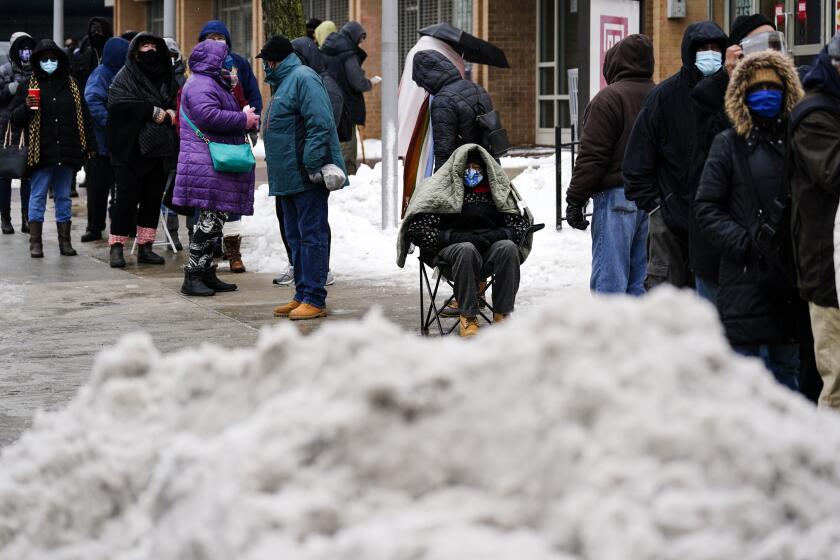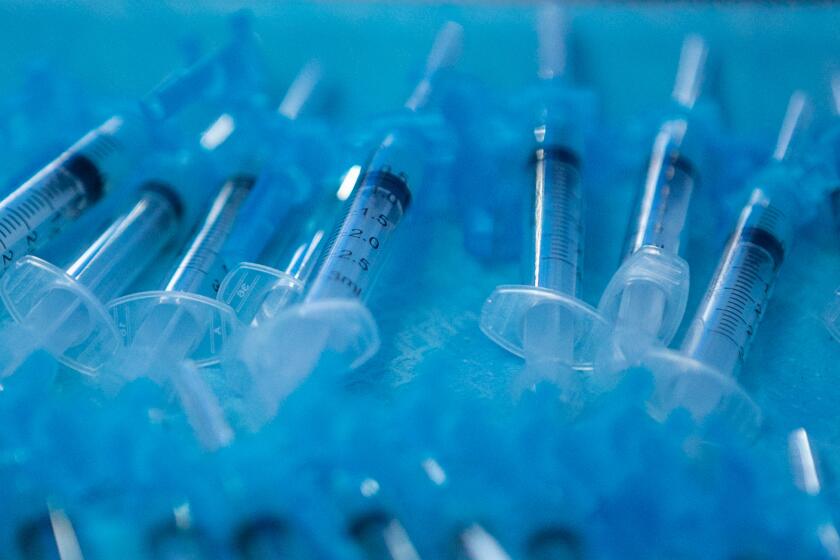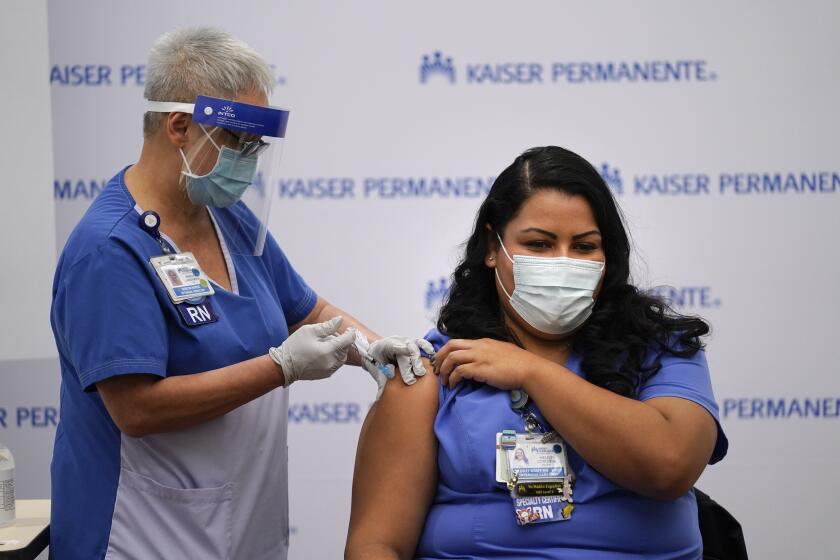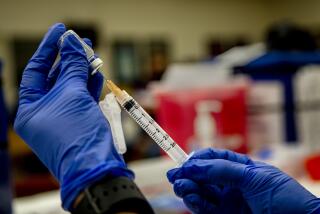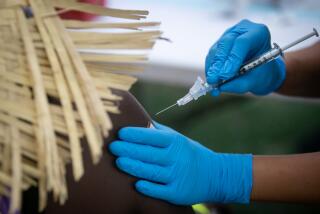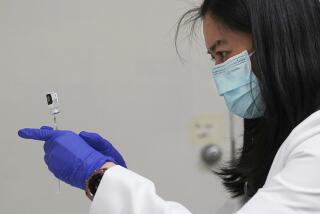California’s rocky COVID-19 vaccine rollout dogged by poor communication, forecasting
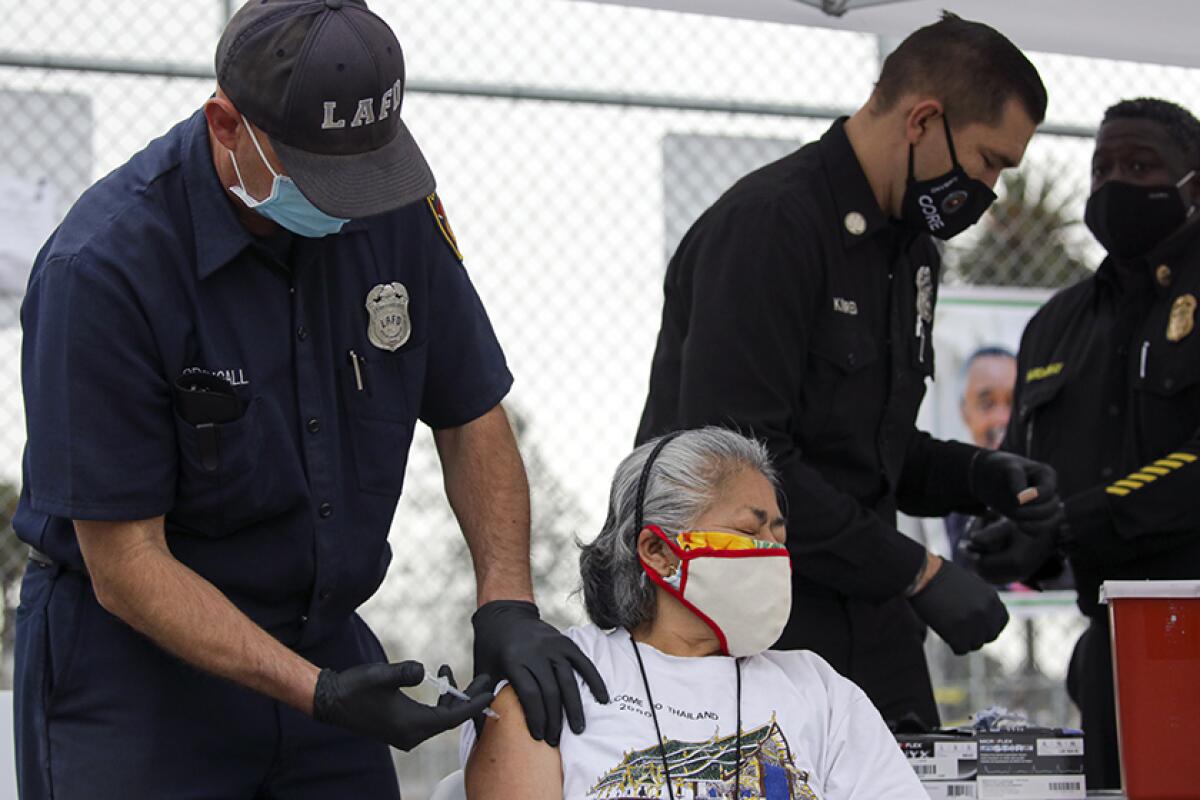
California is failing to provide crucial information about COVID-19 vaccine supply levels to local officials, complicating efforts to schedule appointments and contributing to temporary closures of vaccination sites.
Officials running local vaccination programs in multiple counties say they are not being told how many doses they will receive over the next three weeks, which is key data they need to keep vaccine sites open and running smoothly.
President Biden promised last month that his administration would provide a “reliable three-week supply look-ahead” in an effort to improve the transparency and efficiency of the country’s rocky vaccine rollout.
Gov. Gavin Newsom said he learns every Tuesday morning how many doses the Golden State will receive over the next three weeks. But state officials have yet to share those numbers with many local, city and county leaders, making it difficult to create appointments and plan for the administration of second doses.
“Every vaccine planner right now, we all have nerves in our stomach. We’re nervous about it,” said Joe Prado, community health division manager for the Fresno County Department of Public Health. “We would all like to have a three-week window, but until then we will just continue to do it week to week.”
A California Department of Public Health spokesman did not answer questions about why the state has not shared three-week previews with local health officials. Instead, he said the question is “no longer relevant” because the state is transitioning to a new vaccine distribution model led by Blue Shield of California, under a contract that started Feb. 15.
Newsom, speaking Sunday at a mobile vaccination clinic in Inglewood, said counties will start getting a three-week look-ahead this week as part of the Blue Shield partnership, but he did not elaborate.
A spokeswoman for Blue Shield directed questions to state health officials, who did not respond.
As of Monday, local officials said they still were not getting the advance information.
The communication problems come as winter storms have hammered much of the U.S., delaying shipments of already-scarce vaccine doses to California and other states. Lack of predictability, coupled with ongoing dose shortages, have forced temporary closures at several mass vaccination sites, including Dodger Stadium, Moscone Center in San Francisco and Petco Park in San Diego.
States are trying to catch up after winter weather closed clinics, slowed vaccine deliveries and forced tens of thousands of people to miss their shots.
The production picture for doses is murky at best. Vaccine makers Pfizer and Moderna have been accelerating their weekly production levels, with 13.5 million doses scheduled to be delivered in the U.S. this week, but are not on track to meet their first target of 100 million doses each by March 31 if they continue at their current weekly rates.
The companies have said they are constantly working to ramp up capacity and that their weekly rates will increase.
California is scheduled this week to receive a total of 1.5 million doses, almost evenly split between the two companies.
The number of doses, already scarce, will be stretched even thinner starting next month, when as many as 6 million more Californians will become eligible for the shot. As more people get their first dose, even more of the incoming supply will have to be set aside for second doses.
South and East L.A., parts of the San Gabriel and San Fernando valleys, areas near the L.A. and Long Beach ports and the Antelope Valley have the lowest vaccination rates.
Earlier this month, Los Angeles was forced to close Dodger Stadium and four other city vaccination sites for two days because the city had not received enough doses to keep them open. The stadium and another site, Hansen Dam, closed early at 6 p.m. last week because of a shortage.
All of the city’s sites were closed for vaccinations again this past Friday and Saturday because shipments of at least 63,000 doses were tied up at UPS and FedEx shipment facilities in Kentucky and Tennessee due to severe weather.
Los Angeles County, which allocates vaccine doses to hundreds of local sites, including Dodger Stadium, is not receiving details on shipments three weeks in advance, public health director Barbara Ferrer said Wednesday.
“We still have a fair amount of variability in what we get, week to week,” Ferrer said. “I don’t have any projections about what we’re getting for the next two to three weeks out.”
Ferrer said health officials are still receiving information on dose shipments a week at a time, and that last week, the figures were delayed. Health officials have said for weeks that the lack of transparency makes running an efficient vaccine site more difficult, because appointments, vaccinator shifts and other logistics can’t be planned in advance.
Ferrer said that she was “confident” that the county would begin receiving a better picture of future dose shipments, “but it hasn’t happened yet.”
Orange County is also receiving information about vaccine dose allocations one week at a time, health officer Dr. Clayton Chau said.
Fresno County Supervisor Ernest “Buddy” Mendes said it’s often a surprise how many doses will be granted to his county each week, and officials there can only organize as much as a week in advance.
“You can’t make any plans,” Mendes said. “You can plan out the logistics, but then you don’t have the vaccinations to do it. So a lot of times, you can’t do it.”
Two mass vaccination sites in Fresno stopped giving first doses for 14 days last month due to a lack of supply.
In San Francisco this week, the Moscone Center had to pause vaccinations due to supply shortages a little over a week after it opened as a mass vaccination site.
A spokesperson from the San Francisco Department of Public Health said Thursday that officials still don’t know when first-dose appointments will resume at the Moscone Center. The vaccine supply, they said, “remains limited, inconsistent, and unpredictable.”
“As of now, we never know the following week’s allocations, which makes it challenging to plan ahead,” the department said in a statement.
Blue Shield of California will immediately begin attempting to centralize the state’s COVID-19 vaccination program after a sluggish start.
Late last month, Newsom authorized a deal with Blue Shield of California to run the state’s vaccine program under an emergency contract that did not require legislative approval. Several local health authorities say they haven’t received concrete information about how vaccinations will be handled under Blue Shield.
Blue Shield will create an algorithm to distribute the vaccine, according to the contract for the far-reaching agreement. The company will also have wide latitude to select which healthcare providers and counties will receive and administer doses.
The company will create a statewide vaccine network in three waves, starting with Central Valley counties such as Fresno, Kern, San Joaquin and Stanislaus next week, the state has previously confirmed to The Times. Los Angeles, Orange, San Bernardino, San Diego and Ventura are among the counties in a second wave in early March. The final wave, a week later, would include San Francisco, Contra Costa and Alameda counties.
Vaccine supply to California has increased in recent weeks, but so has the number of vaccination sites across Los Angeles County. That means mega sites like Dodger Stadium are competing against a growing number of vaccine sites for a still-limited number of doses.
Because supply has been so limited, it’s not clear whether Dodger Stadium will reach its promised capacity of 12,000 daily vaccine doses, Los Angeles deputy mayor for public safety Jeff Gorell said. With more supply, the site could provide three or four times as many shots per day, he said.
Los Angeles hasn’t received a guarantee of how many of the 200 million combined doses that Pfizer and Moderna have promised by March 31 will be sent to the city, chief innovation officer Amanda Daflos said.
A new federal vaccination site that opened last week at Cal State L.A. will be receiving its vaccine doses directly from the federal government, rather than through the county. That means the site won’t compete with other L.A. County sites for a limited pool of doses.
More to Read
Sign up for Essential California
The most important California stories and recommendations in your inbox every morning.
You may occasionally receive promotional content from the Los Angeles Times.
